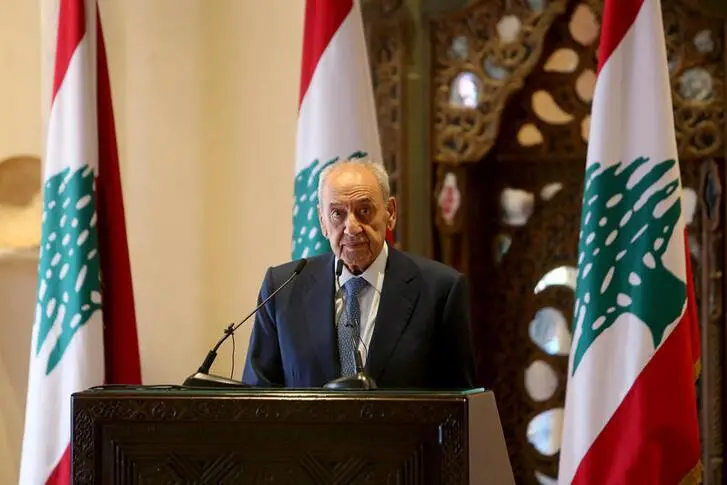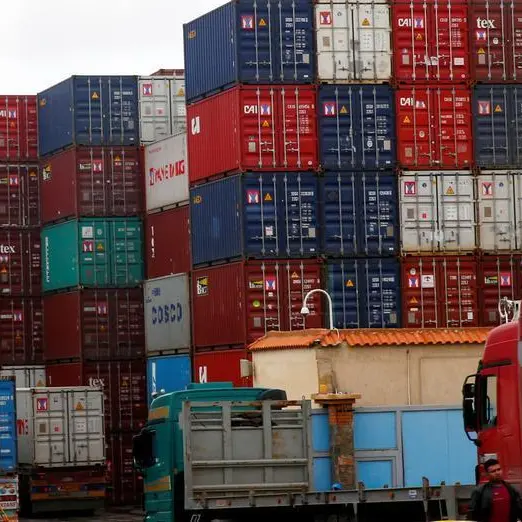PHOTO
BEIRUT: With top leaders not talking to each other and with Parliament Speaker Nabih Berris Cabinet initiative dealt a heavy blow Sunday from MP Gebran Bassil, Lebanon risked descending into the abyss as a result of a political stalemate that has defied local, regional and foreign mediation efforts to break it in a country facing total economic collapse.
President Michel Aoun on the one hand, and Berri and Prime Minister-designate Saad Hariri on the other, appear to be boycotting one another after locking horns over responsibility for delaying the formation of a proposed Cabinet of nonpartisan specialists with no blocking one-third plus one [veto power] to any side.
Such a government would be tasked with implementing a string of essential reforms in line with the French initiative designed to steer Lebanon out of its worst economic and financial crunch since the 1975-90 Civil War and avert a much-feared social implosion. Implementation of long-overdue reforms is deemed crucial for unlocking billions of dollars in promised foreign aid to the cash-strapped country, which is wrestling with multiple crises, including an unprecedented financial downturn.
The boycott among the top leaders has brought the already-stalled Cabinet formation process back to square one, dashing hope for an imminent breakthrough. Worse still, the war of words that raged this week between Aoun and Berri has put the speakers initiative, viewed by many as a last chance to resolve the Cabinet crisis, at a standstill, a political source familiar with the matter told The Daily Star.
In what appeared a sequel to the Aoun-Berri tensions, Bassil Sunday escalated his stance on the Cabinet formation process, saying that the government impasse has exposed more dangerous and deeper crises relating to the countrys sectarian-based ruling system and the Constitution.
The leader of the Free Patriotic Movement also rejected outright Berris latest initiative aimed at breaking the monthslong Cabinet formation deadlock. He said Berris initiative, which calls for the formation of a 24-member Cabinet of nonpartisan specialists with no blocking one-third plus one [veto power] to any side, was a masked tripartite system that divides power between Christians, Sunnis and Shiites.
The [Cabinet] formation crisis has exposed more dangerous and deeper crises. It has exposed a crisis of a [ruling] system, the Constitution, practices and intentions, and this is the ugliest part. It has revealed that the battle for defending [Christian] rights, which we are waging, is not out of outbidding or obstruction, but for protecting our free presence, Bassil said in a televised speech.
For long years, the FPM under Bassil has been fighting a fierce battle to restore Christian rights in the government and the public administration, claiming that those rights had been usurped when Aoun lived in self-exile in France from 1991 until 2005 after the withdrawal of the Syrian army from Lebanon.
Commenting on Bassils escalation, Future Movement MP Mohammad Hajjar told The Daily Star: This is Bassil whom we have known. He is the one blocking the government formation. Unfortunately, he rather than the president is the one directing the negotiations over the Cabinet formation. It seems that the president has become a political aide to Bassil and not the other way round. It has been confirmed that if he does not have the blocking decision, or the blocking one-third [plus one], Bassil will not allow a government to be formed.
The Cabinet formation process has been stalled for months over a rift between Aoun and Hariri regarding who should name two Christian ministers who are not part of the presidents Cabinet share. Aoun and Bassil strongly reject Hariris insistence on naming the two Christian ministers which the premier-designate argues is part of his constitutional powers. Hariri also wants the FPMs Strong Lebanon bloc to grant a confidence vote to the new government in exchange for allotting eight ministers to Aoun in the proposed 24-member Cabinet.
Bassil accused leaders who are committed to the 1989 Taif Accord that ended the Civil War and stipulated equal power sharing between Muslims and Christians of not implementing it properly or respecting its provisions. Because of them, the Taif [Accord] is in jeopardy, he said.
He reiterated that the FPM would not participate in the new government and would not grant it a vote of confidence as Hariri is insisting. The president will sign [the Cabinet formation decrees]. We will not have ministers for us. You will gain Parliaments confidence without us, he said.
Responding to Berri, who said that the president had no constitutional right to even one minister since he does not participate in voting, Bassil said: You reached the point to say to the president: You have no right to name any minister and no word to you to name a prime minister and you have no right for a bloc that authorized you to name [ministers] on its behalf.
Bassil accused the FPMs opponents of lying to Pope Francis and Maronite Patriarch Bechara al-Rai when they talked about their commitment to equality in power sharing between Muslims and Christians.
Referring to Berris Cabinet proposal, which divides the suggested 24 ministers into three groups with no veto power for any side eight ministers for Aoun, eight ministers for Hariri and his allies, and eight ministers to Berris Amal Movement, Hezbollah and their allies Bassil said: You return to us with a masked tripartite [system] and with a Cabinet formula of three eights. The real equal power sharing is 12 and 12 [ministers] to be equally named by Christians and Muslims and not eight [ministers] named by Christians and 16 [ministers] eight and eight named by Muslims. This is a tripartite [formula] that is rejected.
Bassils escalatory position comes amid spiraling tensions between the three top leaders Aoun, Berri and Hariri over the Cabinet formation process. It came a few days after a fierce war of words raged between Aoun and Berri, who traded accusations of violating the Constitution over the Cabinet formation process.
Bassil said he wanted to entrust Hezbollah leader Sayyed Hasan Nasrallah with securing Christian rights in the government and the public administration. Hezbollah is a key ally of Aoun and the FPM.
Today, I want to seek help from a friend, Sayyed Hasan Nasrallah. More than that, I want him to be an arbitrator and trustworthy with the [Cabinet] issue because I trust him and his honesty and I entrust him with the issue of [Christian] rights, Bassil said. He added that Nasrallah, whose party was mediating with the FPM leader to overcome obstacles hindering the Cabinet formation, knows that we are being targeted. He knows that we have conceded many of our rights over the Cabinet issue.
Bassils televised address came a day after EUs foreign policy chief Josep Borrell berated Lebanese politicians for delays in forming a new Cabinet, warning the union could impose sanctions on those blocking a solution to the political stalemate.
Borrell's comments, made after meeting with Aoun at Baabda Palace, came amid reports in Lebanese media that France and the EU were putting together proposals for possible travel bans and freezes on assets of some politicians.
Borrell said he wanted to send a stern message to all Lebanese leaders in the name of the EU and member states that the crisis facing Lebanon was homemade imposed domestically rather than from abroad, and made by the Lebanese themselves.
Borrell said Lebanese politicians should quickly form a new government, implement reforms and reach a deal with the International Monetary Fund to start getting the tiny country out of its paralyzing economic and financial crisis.
"There is no time to waste. You are at the edge of the financial collapse," he said in English.
Borrell also met with Berri, Hariri and caretaker Prime Minister Hassan Diab. He met Sunday with representatives of civil society groups.
"The council of the European Union has been studying other options, including targeted sanctions," Borrell said. "Of course we prefer not to go down this road and we hope that we will not have to but it is in the hands of the Lebanese leadership."
Borrells two-day visit to Beirut came ahead of a meeting of the EUs foreign affairs committee in Luxembourg Monday that will discuss the Lebanese situation, including the European sanctions.
Paris says it has already taken measures to restrict entry for some Lebanese officials it sees as blocking efforts to tackle the crisis, which is rooted in decades of state corruption and debt, although it has not named anyone publicly.
A senior European official told Reuters Paris had set its sights on sanctioning Bassil, who is already under U.S. sanctions.
Copyright 2021, The Daily Star. All rights reserved. Provided by SyndiGate Media Inc. (Syndigate.info).





















